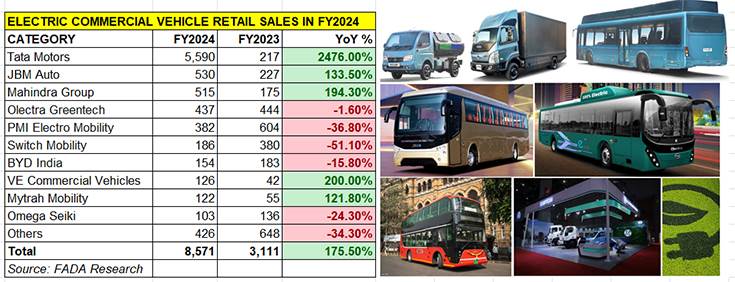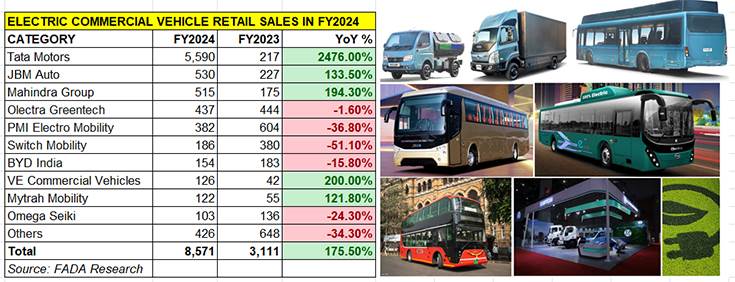The Indian electric vehicle industry has been on a roll in FY2024 with retail sales hitting the 1.67 million units mark, achieving handsome 42% year-on-year growth (FY2023: 1.18 million EVs). While over 944,000 e-two-wheelers (up 30%) did the heavy lifting for India EV Inc, 632,000-plus e-three-wheelers (up 57%) and over 90,000 electric passenger vehicles (up 90%) were also bought last fiscal, with all these three vehicle segments registering best-ever fiscal sales.
Now, the Federation of Automobile Dealers Association (FADA) has revealed the retail sales numbers for the commercial vehicle segment which is seeing a slow shift to electric mobility. According to Manish Raj Singhania, president, FADA, “Electric commercial vehicles witnessed an astounding 175.5% growth YoY with 8,571 units sold, achieving a 0.85% market share. While the base for EV adoption in India is still expanding, these figures underscore the accelerating shift towards electric mobility and highlight the market’s potential for sustainable transportation solutions.”
 Tata Motors, with 5,590 eCVs, had a 65% share of the market in FY2024.
Tata Motors, with 5,590 eCVs, had a 65% share of the market in FY2024.
As per the data, sourced from Vahan, a total of 8,571 eCVs were sold in FY2024, which constitutes strong 175% YoY growth, albeit on a low year-ago base.
Commercial vehicle market leader Tata Motors, which recorded retails of 5,590 eCVs, has a firm grip on the market with a 65% share in FY2024. While the Vahan data does not reveal the type of eCVs sold, suffice it to say that it would have sold a fair number of both electric goods vehicles as well as electric buses. From the small Ace eEV to the Ultra T.7 Electric intermediate eCV targeted at hub-and-spoke deliveries in urban India and the Ultra e-buses, the company has a varied portfolio of eCVs. Till date, Tata Motors has supplied more than 2,000 electric buses across multiple cities in India, which have cumulatively clocked more than 12 crore kilometres.
JBM Auto, the flagship company of the JBM Group, is ranked second in eCV sales in FY2024 with a total of 530 units, an increase of 133% (FY2023: 227 units). The company, which has a strong presence in electric tarmac buses across a number of airports in India, has bagged good orders from State Transport Undertakings and also the private sector. In January 2024, the company flagged off the first lot of JBM Ecolife e-buses at the Panipat Bus Depot in Haryana. The company claims to have an order book of over 5,000 e-buses for supply to a number of STUs including those in Haryana, Delhi, Telangana, Gujarat and Orissa.
The Mahindra Group is ranked third in the eCV sales ladder board with a total of 515 units, up 194% on year-ago sales of 175 units.
Olectra Greentech, which manufactures seven-, nine- and 12-metre electric buses as part of a seven-model range, as well as an electric tipper truck, sold 437 units in FY2024, down by 1.60% YoY (FY2023: 444 units). The company, which is estimated to have an order book of over 8,000 units, is a supplier of electric buses to STUs in Kerala, Gujarat, Hyderabad and Himachal Pradesh and municipal corporations in Mumbai, Thane and Pune among others (for local bus transport operations).
Gurugram-based PMI Electro Mobility, which has its 3,000-units-per-annum manufacturing plant in Dharuhera (Delhi-NCR) and produces seven-, nine- and 12-metre electric buses, registered retail sales of 382 units in FY2024, down 37% on FY2023’s 604 units. The company is currently implementing an expansion programme and plans to commission its second plant in Pune in CY2025, which will double total capacity to 6,000 units per annum. PMI Electro Mobility is among the leading suppliers to STUs across the country and some of its EVs also ply in difficult terrain like Ladakh.
Switch Mobility, the electric vehicle arm of Ashok Leyland, witnessed sales of 186 eCVs comprising buses and light commercial vehicles, down 51% YoY (FY2023: 380 units). The company, which rolled out its first IeV 4 electric LCV from its Hosur plant recently, aims to produce around 3,000 units a year of this type catering to cargo and refrigerated goods transport, a well as garbage collection. It is understood that Switch Mobility has inked MoUs for around 12,500 eLCVs.
